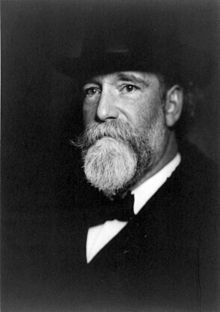
Hiram Clarence Eddy (23 June 1851 - 10 January 1937 [1] ) was a United States organist and composer

Hiram Clarence Eddy (23 June 1851 - 10 January 1937 [1] ) was a United States organist and composer
He was born in Greenfield, Massachusetts. He studied under Dudley Buck in Hartford, Connecticut, counterpoint under Carl August Haupt, and piano under Carl Albert Loeschhorn in Berlin. In 1874-76 he was organist of the First Congregational Church, Chicago; afterward organist and choirmaster of the First Presbyterian Church for 17 years and from 1875 to 1908 was director of the Hershey School of Musical Art. In 1877-79 he gave a series of 100 organ recitals, with entirely different programs, a memorable achievement in American musical annals. He played at several expositions in America and abroad, and gave recitals in the principal American and European cities. He composed several works for the organ, including one method book for instruction.
In the summer of 1871, Eddy went to Berlin to study for a period of more than two years. He studied organ and theory with Carl August Haupt, and piano with Carl Albert Löschorn. En route to Berlin, Eddy visited England and France, making important connections with distinguished organists such as Alexandre Guilmant, Charles-Marie Widor, Camille Saint-Saëns, César Franck, W.T. Best, and others. [2]
Reportedly practicing from six to ten hours a day, he had lessons weekly, and also participated in chamber music activities, in addition to concertizing. One 1873 review spoke highly of Eddy's performance, stating that “all the excellent qualities of the master showed themselves in the playing of the pupil. Massive technique, clearness and certainty, energy in taking the tones and a wonderfully lovely legato.” [2]
Further concerts allowed Eddy to secure the funds necessary to repay the loan which was taken out to enable his European trip. [2] Finally, in the spring of 1874, he returned to the United States after an extensive trip through Holland, Belgium, France, and London.
Returning to the United States with a letter of recommendation from Haupt, [3] Eddy presided as organist at the First Congregational Church in Chicago. He received praise for his playing of the music he had learned in Europe. In 1879, he took the position of organist at First Presbyterian Church, staying there for 17 years. In 1876, Eddy spent one week in Philadelphia playing recitals three times a day at the Centennial Exposition.
During his time in Chicago, he became involved with the Hershey School of Music as general director. It was founded in 1875 by Sara Hershey, and in 1876 the Hershey Music Hall was completed, giving the school the facilities it needed. A three-manual Johnson organ (built to Eddy's specifications) was installed for teaching and concert purposes. Inaugural concerts were performed on January 23 and 25 of 1877.
Continuing to tour and perform extensively, Eddy remained part of the Chicago music scene, including designing and dedicating the Roosevelt organ in the Auditorium Theatre. Eddy left Chicago in 1895, spending the rest of his life touring, teaching, and concertizing, dedicating over 1000 organs in his career. He later wrote organ method books, and teaching remained part of his career after leaving the Hershey school.
Between 1877 and 1879, Eddy gave over 100 recitals, all with different programs [4] on Sunday afternoons at the Hershey Music Hall. Each recital featured a piece by Bach and a variety of contemporary organ works, including transcriptions. Each recital also had two pieces of non-organ music, typically a vocalist, or chamber music. [5]
Eddy moved around between various cites, including New York and Paris. Continuing to concertize up until his death, he also recorded player organ rolls for the Aeolian Company. He died on January 10, 1937, from heart and kidney complications. [6] He is interred in his hometown of Greenfield, Massachusetts.
In 1879, was married to singer Sara Hershey who established the Hershey School of Musical Art in Chicago. [2] Eddy and Hershey divorced in 1905.
{{cite book}}: CS1 maint: multiple names: authors list (link) CS1 maint: numeric names: authors list (link){{cite book}}: CS1 maint: multiple names: authors list (link) CS1 maint: numeric names: authors list (link){{cite book}}: CS1 maint: multiple names: authors list (link) CS1 maint: numeric names: authors list (link){{cite book}}: CS1 maint: multiple names: authors list (link) CS1 maint: numeric names: authors list (link)
Marcel Jean-Jules Dupré was a French organist, composer, and pedagogue.
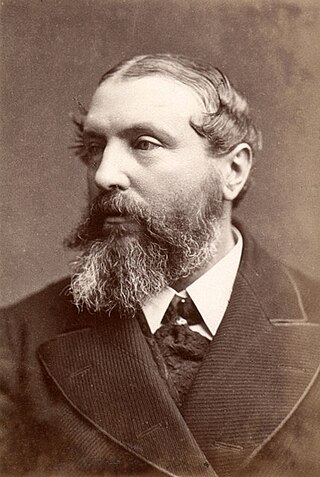
William Thomas Best was an English organist and composer.

Frederick Lewis Swann was an American church and concert organist, choral conductor, composer, and president of the American Guild of Organists. His extensive discography includes both solo organ works and choral ensembles he has conducted.
Whitney Eugene Thayer was an American organist and composer.
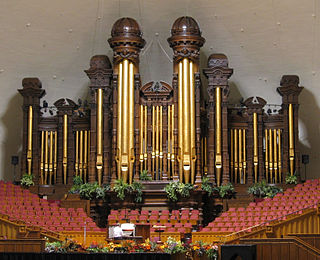
The Salt Lake Tabernacle organ is a pipe organ located in the Salt Lake Tabernacle in Salt Lake City, Utah. Along with the nearby Conference Center organ, it is typically used to accompany the Tabernacle Choir at Temple Square and is also featured in daily noon recitals. It is one of the largest organs in the world. Jack Bethards, president and tonal director of Schoenstein & Co., describes it as an "American classic organ" and "probably one of the most perfect organs ever built."
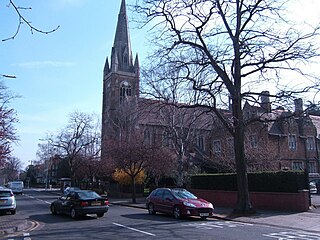
St Matthew's Church, Northampton is a Church of England parish church in Northampton, within the Diocese of Peterborough.
Humphrey John Stewart was an American composer and organist, born in England. A native of London, he came to the United States in 1886, and served for many years as a church organist on the West Coast. In 1898, he was awarded a doctorate degree in music from the University of the Pacific. In 1901, he gave a recital in Buffalo, New York and accepted a position at Trinity Church in Boston, but after two years he returned to San Francisco. In 1915, Stewart took a position as organist at the Panama-California Exposition in San Diego, and stayed in that city for many years, playing open-air organ concerts at Balboa Park.

Marktkirche is the main Protestant church in Wiesbaden, the state capital of Hesse, Germany. The neo-Gothic church on the central Schlossplatz was designed by Carl Boos and built between 1853 and 1862. At the time it was the largest brick building of the Duchy of Nassau. It is also called Nassauer Landesdom.
Diane Meredith Belcher is an American concert organist, teacher, and church musician. She has given a large number of solo recitals throughout the United States and abroad, is a teacher, and has served as Director of Music at Bach Vespers/Holy Trinity Lutheran Church in New York City, Lecturer in Music Theory and Organ at Dartmouth College, in Hanover, New Hampshire, Music Director at Saint Thomas Episcopal Church, Hanover, Co-Organist/Choirmaster at Saint Mark's Episcopal Church in Philadelphia, and head of the Organ Division at Westminster Choir College in Princeton, New Jersey.

James Hotchkiss Rogers was an American organist, composer, teacher, music critic, and publisher.

Sara Hershey-Eddy was an American musician, pianist, contralto vocalist, vocal instructor, and musical educator. She founded the Hershey School of Musical Art in Chicago.
Hershey School of Musical Art was an American school located in Chicago, Illinois.
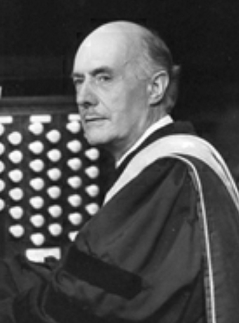
Clarence Dickinson was an American composer and organist.
John Philip Kitchen MBE is a Scottish organist, conductor, early music scholar, and music educator based in Edinburgh. He serves as the Edinburgh City Organist. Kitchen is known for his extensive recording portfolio of organ music, and his research and demonstration of historical keyboard instruments, He made major contributions to the discography and scholarship on the organ works of William Russell, and Johann Ludwig Krebs.

Lynnwood Farnam was a Canadian organist who became the preeminent organist in North America in the 1920s until his death. He was influential in promoting the music of Bach, and also championed French organ music contemporary to his day. He became acquainted with the most important American and European organists of his day, and upon his early death, several major works were dedicated to his memory. He was known for his superb technical ability and knowledge of organ registration, but he avoided performances intended to "show off" the organist, preferring the attention to be drawn to the music.

Gorjes Christian Crawford-Hellemann was an Australian composer, conductor and organist. He was born in 1881 to William Thomas and Harriet Ann Crawford-Hellemann in Towrang, NSW Australia. He was an Associate of the Royal College of Music. He was organist of Christ Church St Laurence, Sydney, 1927-1931 and 1933–1934. He died 26 February 1954.
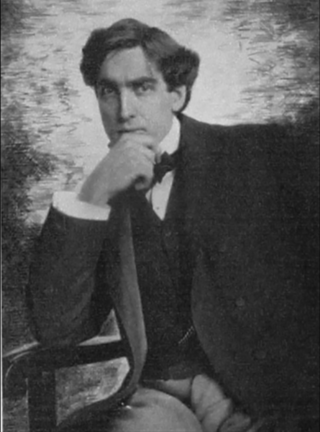
Charles Henry Galloway was a St. Louis, Missouri church and concert organist, choral conductor, educator, and composer.
Helen Searles Westbrook was an American composer and organist who appeared with Chicago Symphony.
Mary Eliza Watson Weaver was an American composer, pianist, and poet who was born in Kansas City, Missouri.
Clarence Everett Watters FAGO MMus was an American organist, choirmaster and teacher who specialized in the works of Johann Sebastian Bach as well as 19th and 20th century French composers such as Marcel Dupré, with whom he had studied in France. He directed the music department at Trinity College, Hartford, in Connecticut from 1932 to 1967 and was also a visiting professor of organ at Yale University.